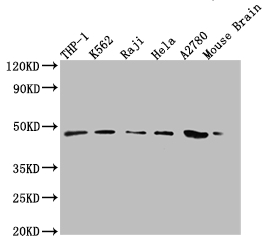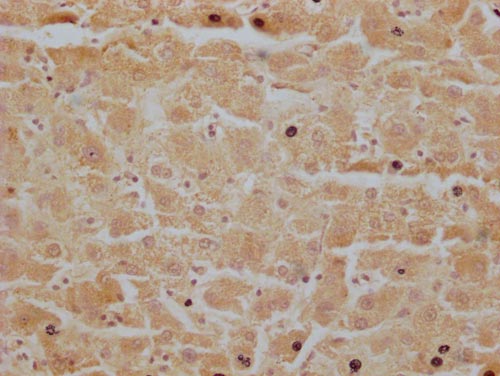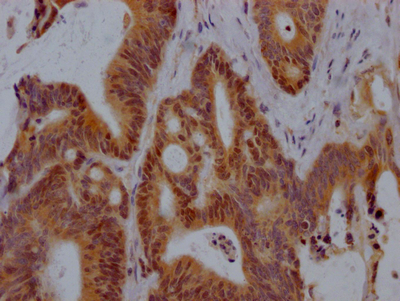MR1 Antibody
-
货号:CSB-PA853268LA01HU
-
规格:¥440
-
促销:
-
图片:
-
Western Blot
Positive WB detected in: THP-1 whole cell lysate, K-562 whole cell lysate, Raji whole cell lysate, Hela whole cell lysate, A2780 whole cell lysate, Mouse Brain tissue
All lanes: MR1 antibody at 1:2000
Secondary
Goat polyclonal to rabbit IgG at 1/50000 dilution
Predicted band size: 40, 35, 29, 26 kDa
Observed band size: 48 kDa -
IHC image of CSB-PA853268LA01HU diluted at 1:200 and staining in paraffin-embedded human liver tissue performed on a Leica BondTM system. After dewaxing and hydration, antigen retrieval was mediated by high pressure in a citrate buffer (pH 6.0). Section was blocked with 10% normal goat serum 30min at RT. Then primary antibody (1% BSA) was incubated at 4°C overnight. The primary is detected by a Goat anti-rabbit polymer IgG labeled by HRP and visualized using 0.05% DAB.
-
Immunofluorescence staining of HepG2 cells with CSB-PA853268LA01HU at 1:200, counter-stained with DAPI.The cells were fixed in 4% formaldehyde, permeated by 0.2% TritonX-100, and blocked in 10% normal Goat Serum. The cells were then incubated with the antibody overnight at 4°C. Nuclear DNA was labeled in blue with DAPI. The secondary antibody was Alexa Fluor 488-congugated AffiniPure Goat Anti-Rabbit IgG(H+L)
-
-
其他:
产品详情
-
产品描述:
MR1 polyclonal antibody CSB-PA853268LA01HU was harvested from the rabbits immunized with the recombinant human major histocompatibility complex class I-related gene protein (150-253aa). The target protein MR1 mainly alerts the immune system to the presence of infected or malignant cells that express the stress-induced self-antigens and presents these abnormal cells to natural killer (NK) cells and some T cells for destruction.
This rabbit anti-human MR1 polyclonal antibody has validated the specificity and reliability in the ELISA, WB, IHC, and IF applications. The non-conjugated IgG got purified by protein G and reached up to 95% in purity. It only reacts with the human MR1 protein.
-
产品名称:Rabbit anti-Homo sapiens (Human) MR1 Polyclonal antibody
-
Uniprot No.:Q95460
-
基因名:MR1
-
别名:Class I histocompatibility antigen like protein antibody; Class I histocompatibility antigen-like protein antibody; HLALS antibody; HMR1_HUMAN antibody; Major histocompatibility complex class I like sequence antibody; Major histocompatibility complex class I related antibody; Major histocompatibility complex class I related gene protein antibody; Major histocompatibility complex class I related isoform CRA a antibody; Major histocompatibility complex class I related isoform CRA c antibody; Major histocompatibility complex class I related isoform CRA d antibody; Major histocompatibility complex class I-related gene protein antibody; MHC class I like antigen MR 1 antibody; MHC class I like antigen MR1 antibody; MHC class I related gene protein antibody; MHC class I related protein 1 isoform B antibody; MHC class I related protein 1 isoform C antibody; MHC class I-related gene protein antibody; MR 1 antibody; Mr1 antibody; Mr1 protein antibody; MR1B antibody; MR1C antibody
-
宿主:Rabbit
-
反应种属:Human, Mouse
-
免疫原:Recombinant Human Major histocompatibility complex class I-related gene protein (150-253AA)
-
免疫原种属:Homo sapiens (Human)
-
标记方式:Non-conjugated
本页面中的产品,MR1 Antibody (CSB-PA853268LA01HU),的标记方式是Non-conjugated。对于MR1 Antibody,我们还提供其他标记。见下表:
-
克隆类型:Polyclonal
-
抗体亚型:IgG
-
纯化方式:>95%, Protein G purified
-
浓度:It differs from different batches. Please contact us to confirm it.
-
保存缓冲液:Preservative: 0.03% Proclin 300
Constituents: 50% Glycerol, 0.01M PBS, PH 7.4 -
产品提供形式:Liquid
-
应用范围:ELISA, WB, IHC, IF
-
推荐稀释比:
Application Recommended Dilution WB 1:1000-1:5000 IHC 1:20-1:200 IF 1:50-1:200 -
Protocols:
-
储存条件:Upon receipt, store at -20°C or -80°C. Avoid repeated freeze.
-
货期:Basically, we can dispatch the products out in 1-3 working days after receiving your orders. Delivery time maybe differs from different purchasing way or location, please kindly consult your local distributors for specific delivery time.
相关产品
靶点详情
-
功能:Antigen-presenting molecule specialized in displaying microbial pyrimidine-based metabolites to alpha-beta T cell receptors (TCR) on innate-type mucosal-associated invariant T (MAIT) cells. In complex with B2M preferentially presents riboflavin-derived metabolites to semi-invariant TRAV1-2 TCRs on MAIT cells, guiding immune surveillance of the microbial metabolome at mucosal epithelial barriers. Signature pyrimidine-based microbial antigens are generated via non-enzymatic condensation of metabolite intermediates of the riboflavin pathway with by-products arising from other metabolic pathways such as glycolysis. Typical potent antigenic metabolites are 5-(2-oxoethylideneamino)-6-D-ribitylaminouracil (5-OE-RU) and 5-(2-oxopropylideneamino)-6-D-ribitylaminouracil (5-OP-RU), products of condensation of 5-amino-6-D-ribityaminouracil (5-A-RU) with glyoxal or methylglyoxal by-products, respectively. May present microbial antigens to various TRAV1-2-negative MAIT cell subsets, providing for unique recognition of diverse microbes, including pathogens that do not synthesize riboflavin. Upon antigen recognition, elicits rapid innate-type MAIT cell activation to eliminate pathogenic microbes by directly killing infected cells. During T cell development, drives thymic selection and post-thymic terminal differentiation of MAIT cells in a process dependent on commensal microflora. Acts as an immune sensor of cancer cell metabolome. May present a tumor-specific or -associated metabolite essential for cancer cell survival to a pan-cancer TCR consisting of TRAV38.2-DV8*TRAJ31 alpha chain paired with a TRBV25.1*TRBJ2.3 beta chain on a non-MAIT CD8-positive T cell clone (MC.7.G5), triggering T cell-mediated killing of a wide range of cancer cell types.
-
基因功能参考文献:
- Human mucosal-associated invariant T cells possess capacity for B cell help via MR1-mediated immunoglobulins production. PMID: 28807929
- Early endosomal TLR9 activation is important for MR1-mediated bacterial antigen presentation in B cells. PMID: 28518215
- Polymorphism in MR1 gene is associated with susceptibility to tuberculosis. PMID: 27881839
- we have shown that MR1-mediated MAIT cell activation is tightly regulated at several levels. Efficient MR1-mediated MAIT cell activation requires both intact bacteria to access an acidified endolysomal compartment and activation of the APC through NF-kappaB or interferon signaling pathways. PMID: 27105778
- results suggest that high expression of MR-1 is involved in hepatocellular carcinoma progression PMID: 26823810
- Data show that the major histocompatibility complex, class I-related protein (MR1) antigen presentation is characterized by a rapid 'off-on-off' mechanism that is strictly dependent on antigen availability. PMID: 27043408
- endosome-mediated trafficking of MR1 allows for selective sampling of the intracellular environment PMID: 27031111
- Studies indicate that the antigen-presenting molecules CD1 and MHC class I-related protein (MR1) display lipids and small molecules to T cells. PMID: 26388332
- Data indicate that high expression of CD26 ia a specific markers to define major histocompatibility complex, class I-like sequence protein MR1-restricted mucosa-associated invariant T (MAIT) cells. PMID: 25752900
- Mucosal-associated invariant T cell adaptation was a direct consequence of exposure to various exogenous MR1-restricted epitopes. PMID: 25049333
- [review] Mucosal-associated invariant T-cell (MAIT) T-cell antigen receptor recognizes riboflavin and folic acid metabolites bound by MR1 in a conserved docking mode and thus acts like a pattern recognition receptor. PMID: 24556396
- MR1 tetramers allow precise phenotypic characterization of human and mouse mucosal-associated invariant T cells. PMID: 24101382
- A novel MR1B isoform probably plays a physiological role complementary to MR1A with respect to mucosal-associated invariant T cells development and/or function. PMID: 23457030
- Human thymic MR1-restricted MAIT cells are innate pathogen-reactive effectors that adapt following thymic egress. PMID: 22692454
- metabolites of vitamin B represent a class of antigen that are presented by MR1 for MAIT-cell immunosurveillance; as many vitamin biosynthetic pathways are unique to bacteria and yeast, data suggest that MAIT cells use these metabolites to detect microbial infection PMID: 23051753
- Mutagenesis of MR1 showed that only two residues, which were centrally positioned and on opposing sides of the antigen-binding cleft of MR1, were essential for MAIT cell activation PMID: 22412157
- Taken together these results strongly suggest that MR1 needs to bind proteasome-independent ligands in order to properly reach the cell surface. PMID: 21777569
- fact that MR1 seems mainly intracellular might offer clues as to the process, given the precedence in other class I molecules PMID: 21190736
- MR1 molecules can associate with the peptide-loading complex and can be detected at low levels at the surface of transfected cells. PMID: 12794138
- Our results demonstrated a preferential association of MR1 with beta(2)-microglobulin in MHC class I-deficient B cell lines. PMID: 18068122
- the presentation pathway of MR1 to MAIT cells is highly evolutionarily conserved PMID: 19416870
- Induction of MHC class I-like antigen is associated with relapsed chronic myeloid leukemia. PMID: 19706888
- a function for MR1 in the development of IgA producing plasma cells. PMID: 19760593
显示更多
收起更多
-
亚细胞定位:Cell membrane; Single-pass type I membrane protein. Endoplasmic reticulum membrane; Single-pass type I membrane protein. Golgi apparatus membrane; Single-pass type I membrane protein. Early endosome membrane; Single-pass type I membrane protein. Late endosome membrane; Single-pass type I membrane protein.; [Isoform 1]: Cell membrane; Single-pass type I membrane protein. Endoplasmic reticulum membrane; Single-pass membrane protein.; [Isoform 3]: Cell membrane; Single-pass type I membrane protein. Endoplasmic reticulum membrane; Single-pass membrane protein.; [Isoform 4]: Secreted.
-
蛋白家族:MHC class I family
-
组织特异性:Ubiquitous. Low expression is detected in peripheral blood B cells, T cells, monocytes and in bronchial epithelial cells (at protein level). Expressed in plasmablasts or plasma B cells in the lamina propria of ileum, appendix and colon (at protein level).
-
数据库链接:
HGNC: 4975
OMIM: 600764
KEGG: hsa:3140
STRING: 9606.ENSP00000356552
UniGene: Hs.13500
Most popular with customers
-
Phospho-YAP1 (S127) Recombinant Monoclonal Antibody
Applications: ELISA, WB, IHC
Species Reactivity: Human
-
-
-
-
-
-
-
























